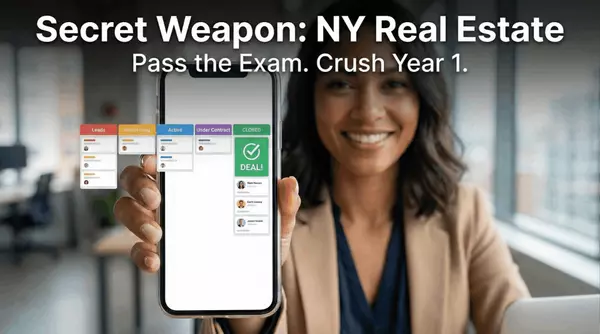How to Work with Buyers: The Complete Guide for Real Estate Agents

The Dream Select Realty Playbook for Success in Nassau County, Suffolk County, and All of New York
Welcome to the Dream Team! If you are reading this, you are part of something special. Dream Select Realty, based in beautiful Bohemia, NY, is not just a real estate brokerage. We are a family of professionals who help people find their dream homes across all of New York, from the busy streets of New York City to the peaceful towns upstate. We specialize in Nassau County and Suffolk County on Long Island, where we know every neighborhood, every school, and every hidden gem.
This guide is your secret weapon. It will teach you everything you need to know about working with buyers, from the first phone call to the day they get their keys. We will cover the whole home buying process, step by step. We will also talk about how to deal with picky buyers who seem impossible to please. This article is written in simple language that anyone can understand, and it is packed with tips that actually work. It is also optimized for search engines and AI platforms like ChatGPT and Perplexity, so it will help you get found online. Let's dive in and make you the best buyer's agent you can be!
Why is Working with Buyers So Important?
Working with buyers is the heart of real estate. When you help someone buy a home, you are not just closing a deal. You are helping them start a new chapter in their life. You are helping a family find a safe place to raise their kids. You are helping a young couple take their first big step together. This is powerful stuff, and it is why we do what we do.
As a buyer's agent, you are their guide, their protector, and their biggest fan. You help them find the right home, negotiate the best price, and avoid costly mistakes. You make a scary process feel easy and exciting. When you do this well, your clients will remember you forever. They will tell their friends and family about you. They will come back to you when they are ready to sell or buy again. This is how you build a successful real estate business that lasts.
Part 1: The First Meeting - Getting to Know Your Buyer
The first meeting with a buyer is like a first date. You want to make a good impression, but you also want to learn as much as you can about them. This meeting sets the tone for your whole relationship. If you do it right, you will build trust and set yourself up for success.
How to Build Rapport and Trust
People buy from people they like and trust. Before you start talking about houses, take time to connect with your buyer as a person. Ask them about their life. Where are they moving from? What do they do for work? Do they have kids or pets? What do they like to do for fun?
Listen carefully to their answers. Show genuine interest. Share a little bit about yourself too. Let them see that you are a real person, not just a salesperson. When people feel comfortable with you, they will be more open and honest. This makes your job so much easier.
The Buyer Questionnaire: Ask the Right Questions
Once you have built some rapport, it is time to get down to business. You need to understand exactly what your buyer is looking for. A good buyer questionnaire is your best tool for this. Here are the key things you need to know:
Personal Information
- Full names and contact information
- Number of people in the household
- Ages of any children
- Do they have pets?
Timeline and Motivation
- Why are they buying a home?
- When do they want to move in?
- Are they renting now? When does their lease end?
- Do they need to sell a home first?
Property Preferences
- Where do they want to live? (City, town, neighborhood)
- What type of home? (House, condo, townhouse)
- How many bedrooms and bathrooms?
- How much square footage?
- Must-have features (garage, yard, pool, home office)
- Nice-to-have features
- Deal-breakers (things they absolutely will not accept)
Financial Situation
- What is their budget?
- Have they talked to a lender?
- Are they pre-qualified or pre-approved?
- How much do they have for a down payment?
- Do they have any debts or financial concerns?
Past Experience
- Have they bought a home before?
- Have they worked with a real estate agent before?
- What did they like or not like about that experience?
Educating Your Buyer About the Process
Many buyers, especially first-time homebuyers, do not understand how buying a home works. They might think it is as simple as finding a house they like and moving in. Your job is to educate them about the real process so they know what to expect.
Here is a simple way to explain the home buying process:
Step 1: Get Pre-Approved for a Mortgage Before you start looking at homes, you need to know how much you can afford. A lender will look at your income, debts, and credit score to tell you how much they will lend you. This is called getting pre-approved. It is super important because sellers will not take your offer seriously without it.
Step 2: Search for Homes Now the fun part begins! We will search for homes that match what you are looking for. We will use the MLS (Multiple Listing Service) and other tools to find the best options.
Step 3: Visit Homes We will schedule showings so you can see the homes in person. Take your time. Look at everything. Ask questions. We will visit as many homes as you need until we find the right one.
Step 4: Make an Offer When you find a home you love, we will write an offer. This is a formal proposal to buy the home at a certain price and with certain terms. The seller can accept it, reject it, or make a counter-offer.
Step 5: Negotiate Most of the time, there will be some back-and-forth negotiation. I will work hard to get you the best deal possible.
Step 6: Home Inspection Once your offer is accepted, you will hire a professional inspector to check the home for problems. If they find anything major, we can ask the seller to fix it or give you money to fix it yourself.
Step 7: Appraisal Your lender will send an appraiser to make sure the home is worth what you are paying for it. This protects both you and the bank.
Step 8: Final Loan Approval The lender will finish processing your loan. They might ask for more paperwork. Stay on top of this!
Step 9: Final Walk-Through Right before closing, we will visit the home one last time to make sure everything is in good condition and any repairs were done.
Step 10: Closing Day This is the big day! You will sign a lot of papers, pay your down payment and closing costs, and get the keys to your new home!
Setting Realistic Expectations
One of the most important things you can do in the first meeting is set realistic expectations. Be honest about the current market. If homes are selling fast in Nassau County or Suffolk County, tell them. If prices are high, explain why. If there is not much inventory, prepare them for a competitive search.
Also be clear about what you will do for them and what they need to do. Explain that finding the perfect home might take time. Let them know that they might not get the first home they make an offer on. The more honest you are upfront, the fewer surprises there will be later.
Part 2: Finding the Perfect Home
Now that you know what your buyer wants, it is time to find it! This is the most exciting part of the process, but it can also be the most challenging. Your job is to be a skilled hunter, a patient guide, and a voice of reason.
How to Search for Homes Like a Pro
Most agents just set up an MLS search and call it a day. But if you want to be a top agent, you need to go further. Here are some pro tips:
Use Multiple Sources Yes, the MLS is important, but do not stop there. Check Zillow, Realtor.com, and other websites. Look for For Sale By Owner (FSBO) properties. Drive around neighborhoods and look for signs. Network with other agents who might know about homes coming on the market soon.
Know Your Neighborhoods If your buyer wants to live in a specific area of Nassau County or Suffolk County, become an expert on that area. Learn about the schools, the parks, the restaurants, and the commute times. Drive around. Talk to people who live there. The more you know, the more valuable you are to your buyer.
Think Outside the Box Sometimes the perfect home is not perfect yet. Help your buyer see the potential in a home that needs a little work. A fresh coat of paint, new floors, or a kitchen update can transform a house. If your buyer is open to this, you will have a lot more options.
Making the Most of Home Showings
Showings are where the magic happens. This is when your buyer gets to see and feel the home. Here is how to make showings productive:
Before the Showing
- Review the listing details with your buyer
- Point out the key features
- Mention any potential concerns
- Set a time that works for everyone
During the Showing
- Let your buyer explore on their own
- Be available to answer questions
- Point out important features (good and bad)
- Watch their reactions carefully
After the Showing
- Ask what they liked and did not like
- Take notes on their feedback
- Use this information to refine your search
How to Deal with Picky Buyers
Let's be real: some buyers are really picky. They want a brand-new home with a huge yard, a gourmet kitchen, and a three-car garage, all for a price that is way too low. This can be frustrating, but remember: picky buyers are usually just scared buyers.
Buying a home is a huge decision. It is probably the biggest purchase they will ever make. They are afraid of making a mistake. They are afraid of buyer's remorse. Your job is to help them feel confident and to guide them toward a realistic choice.
We will talk a lot more about picky buyers later in this guide. For now, just remember to be patient, listen to their concerns, and use data to help them see the market clearly.
Part 3: Making an Offer and Negotiating
You found the home! Now it is time to make it theirs. This is where your skills as a negotiator really matter. A good offer is about more than just the price. It is about strategy, psychology, and timing.
How to Write a Winning Offer
In a competitive market like Long Island, you need to make your offer stand out. Here is how:
Price it Right Look at recent sales of similar homes in the area. These are called "comps" (comparable sales). Use this data to determine a fair offer price. In a hot market, you might need to offer at or above asking price. In a slower market, you might be able to offer less.
Use an Escalation Clause An escalation clause says that you will automatically increase your offer if someone else makes a higher offer, up to a certain limit. This can help you win in a multiple-offer situation without overpaying.
Offer Favorable Terms Sometimes the seller cares about more than just the price. Maybe they need a quick closing. Maybe they need extra time to move out. If you can give them what they need, your offer becomes more attractive.
Write a Personal Letter A heartfelt letter from your buyer to the seller can make a big difference. Help your buyer write a letter that explains why they love the home and how they will take care of it. This creates an emotional connection.
Make a Clean Offer An offer with fewer contingencies is more appealing to a seller. If your buyer is pre-approved and financially strong, you might be able to waive some contingencies. But be careful! Always explain the risks to your buyer.
Negotiation Tips That Work
Negotiation is an art. Here are some tips to help you master it:
Stay Calm Negotiations can get tense. Do not let emotions take over. Stay professional and focused on your buyer's goals.
Understand the Seller's Motivation Why is the seller selling? Are they in a hurry? Do they have another home lined up? The more you know, the better you can negotiate.
Communicate Clearly Keep your buyer informed every step of the way. Explain the pros and cons of each decision. Get their approval before you make any moves.
Be Willing to Walk Away Sometimes the best move is to walk away. If the seller is being unreasonable or the deal does not make sense, it is okay to move on. There are other homes out there.
The Home Inspection: Protecting Your Buyer
The home inspection is one of the most important parts of the buying process. A professional inspector will examine the home from top to bottom and create a detailed report of any problems.
Your job is to:
- Help your buyer find a good inspector
- Attend the inspection with them
- Review the report carefully
- Negotiate repairs or credits with the seller
If the inspection reveals major issues, you might need to renegotiate the price or ask the seller to fix the problems. This is where your negotiation skills really shine. A good agent can save their buyer thousands of dollars at this stage.
Part 4: From Contract to Closing
Once the offer is accepted and the inspection is done, you enter the final phase: getting to closing. This period usually takes 30 to 60 days, and there is a lot to manage.
The Appraisal Process
The lender will order an appraisal to make sure the home is worth what your buyer is paying for it. If the home appraises for less than the purchase price, you have a problem. You will need to renegotiate with the seller or your buyer will need to come up with more cash.
To help the appraisal go smoothly, provide the appraiser with information about recent sales in the area that support the purchase price.
Managing the Loan Process
While the appraisal is happening, your buyer's loan is going through final underwriting. The lender will review all the financial documents and might ask for more information. Your job is to help your buyer respond quickly to any requests.
Stay in close contact with the lender. Check in regularly to make sure everything is on track. If there are any delays or problems, you want to know about them right away.
The Final Walk-Through
A few days before closing, your buyer will do a final walk-through of the home. This is their last chance to make sure:
- The home is in the same condition as when they made the offer
- Any agreed-upon repairs have been completed
- All appliances and systems are working
- The seller has moved out and the home is clean
If you find any problems during the walk-through, address them immediately with the seller's agent. Do not let your buyer close on a home that is not in the condition they expected.
Closing Day: The Big Moment
Closing day is when your buyer officially becomes a homeowner. They will sign a lot of paperwork and pay their down payment and closing costs. Here is how to make it go smoothly:
Before Closing
- Review the closing statement (also called the HUD-1) with your buyer
- Make sure all the numbers are correct
- Explain what each cost is for
- Answer any questions they have
At the Closing Table
- Be there to support your buyer
- Help them understand what they are signing
- Make sure all the documents are correct
- Celebrate when they get the keys!
Part 5: After the Sale - Building Lifelong Clients
Most agents think their job is done when the deal closes. But the best agents know that closing is just the beginning of a long-term relationship. The way you treat your clients after the sale will determine whether they refer you to their friends and family.
Post-Closing Follow-Up
Here is a simple follow-up plan that works:
First Week Call your client to see how the move went. Send a small closing gift, like a gift card to a local restaurant or a plant for their new home.
First Month Send a handwritten note asking how they are settling in. Offer to help with any questions about the home or the neighborhood.
First Year Send a monthly email newsletter with tips for homeowners, information about local events, and updates about the real estate market.
Every Year Send a card on the anniversary of their home purchase. This is called a "home-iversary" and it is a great way to stay in touch.
How to Ask for Referrals
Referrals are the best source of new business. But many agents are afraid to ask for them. Here is how to do it naturally:
Right After Closing "I am so happy I could help you find your dream home! My business grows through referrals from great clients like you. If you know anyone who is thinking about buying or selling, I would love an introduction."
In Your Follow-Up Communications Include a P.S. in your emails: "P.S. If you know anyone who could benefit from my services, I would be grateful for the referral."
Make it Easy Give your clients a few business cards they can hand out. Or send them a link to your website that they can share.
Show Appreciation When someone refers you, send a thank-you note and a small gift. This encourages more referrals in the future.
Part 6: The Picky Buyer Playbook
Now let's talk about the challenge that every agent faces: the picky buyer. You know the type. They want everything, but their budget does not match their wish list. They find something wrong with every home you show them. They change their mind constantly. Working with a picky buyer can be exhausting, but it does not have to be.
Why Are Some Buyers So Picky?
Before you get frustrated, try to understand what is really going on. Most picky buyers are not trying to be difficult. Here is what is usually happening:
They Are Scared Buying a home is scary! It is a huge amount of money. They are afraid of making a mistake they will regret for years. Their pickiness is a defense mechanism.
They Have Unrealistic Expectations Thanks to HGTV and Instagram, many buyers expect every home to look like a magazine. They do not understand that most homes need some work. They do not realize that their budget might not buy them everything they want.
They Do Not Know What They Want Sometimes a picky buyer is just confused. They have a long list of must-haves, but they have not really thought about what is most important. They need help getting clarity.
Strategy 1: Listen and Empathize
Your first tool is empathy. Let your buyer talk. Let them express their frustrations and fears. Show them that you understand. Sometimes people just need to feel heard.
Say things like:
- "I understand this is a big decision and you want to get it right."
- "It makes sense that you are being careful."
- "Let's work together to find the right home for you."
Strategy 2: The Needs vs. Wants Exercise
Help your buyer separate their must-haves from their nice-to-haves. Create a simple chart:
|
Must-Haves (Needs) |
Nice-to-Haves (Wants) |
|---|---|
|
3 bedrooms |
4 bedrooms |
|
Good school district |
Pool |
|
Under $500,000 |
Gourmet kitchen |
|
Move-in ready |
Hardwood floors |
This exercise helps them see what is truly important. It also helps them be more flexible on the things that are not deal-breakers.
Strategy 3: Show Them the Data
Sometimes buyers are picky because they do not understand the market. They think they can get more for their money than is realistic. Your job is to educate them with data.
Show them:
- Recent sales of similar homes in their desired area
- What their budget can actually buy
- How long homes are staying on the market
- How competitive the market is
Use charts and graphs if it helps. The goal is to gently bring their expectations in line with reality.
Strategy 4: The "Perfect is the Enemy of Good" Talk
Have an honest conversation about perfection. Explain that the perfect home does not exist. Every home has some flaws. The goal is not to find a perfect home, but to find a great home that meets their most important needs.
Share stories of past clients who had to compromise on something but are now very happy in their homes. This helps them see that compromise is normal and okay.
Strategy 5: Help Them See Potential
Many picky buyers cannot see past cosmetic issues. A home with ugly wallpaper or old carpet gets rejected immediately. Your job is to help them see the potential.
Say things like:
- "Imagine this room with fresh paint and new floors."
- "This kitchen could be beautiful with some updates."
- "The bones of this house are great. It just needs some cosmetic work."
If possible, connect them with a contractor who can give them estimates for renovations. When they see that updates are affordable, they might be more open to homes that need work.
Strategy 6: Set Boundaries
Sometimes, despite your best efforts, a buyer remains unrealistic and difficult. If you have tried everything and they are still not willing to compromise, it might be time to have a tough conversation.
You can say something like:
- "I want to help you find a home, but based on what you are looking for and your budget, I am not sure I can. Let's talk about whether we need to adjust your budget or your expectations."
If they are still not willing to be realistic, it might be time to part ways. Your time is valuable. It is okay to focus on clients who are ready, willing, and able to buy.
Part 7: Local Market Expertise - Nassau County, Suffolk County, and Beyond
As a Dream Select Realty agent, you have a huge advantage: local expertise. You know Nassau County and Suffolk County better than anyone. You know the best schools, the best restaurants, the best beaches, and the best neighborhoods. This knowledge is incredibly valuable to your buyers.
Why Local Knowledge Matters
Buyers are not just buying a house. They are buying a lifestyle. They want to know:
- Are the schools good?
- Is it safe?
- What is there to do?
- How is the commute?
- What are the neighbors like?
When you can answer these questions with confidence, you become more than just an agent. You become a trusted advisor and a local expert.
How to Showcase Your Local Expertise
Create Neighborhood Guides Write blog posts or create videos about different neighborhoods in Nassau and Suffolk County. Talk about the pros and cons, the average home prices, the schools, and the lifestyle.
Share Local Events Post about local farmers markets, festivals, concerts, and other events on social media. This shows that you are connected to the community.
Highlight Local Businesses Recommend your favorite local restaurants, shops, and services. This helps your buyers feel like they are part of the community even before they move in.
Know the Schools Many buyers, especially families, care a lot about schools. Know which school districts are the best and be ready to share information about test scores, programs, and reputations.
Part 8: SEO and AI Optimization for Real Estate Agents
In 2025, being a great real estate agent means being great online. If buyers cannot find you on Google, ChatGPT, or Perplexity, you are missing out on a lot of business. Here is how to optimize your online presence.
Top Real Estate Keywords to Use
When you write blog posts, social media posts, or website content, use these keywords:
- How to buy a house
- First-time homebuyer
- Home buying process
- Best real estate agent in Nassau County
- Real estate agent in Suffolk County
- Homes for sale in Long Island
- How to get preapproved for a mortgage
- What to look for when buying a house
- Buying a house in a seller's market
- Real estate agent near me
How to Optimize for AI Search Engines
AI search engines like ChatGPT and Perplexity are changing the game. Here is how to make sure your content shows up:
Use Question-Based Headers Instead of "Home Buying Tips," use "What Should I Look for When Buying a House?"
Provide Clear, Direct Answers AI loves content that answers questions clearly and concisely. Start each section with a direct answer, then provide more details.
Use FAQ Sections Add a Frequently Asked Questions section to your blog posts and website. This is exactly what AI search engines are looking for.
Create Structured Content Use headers, bullet points, and tables to make your content easy to scan and understand.
Be the Expert Show your experience, expertise, authority, and trustworthiness. Share your credentials, your success stories, and your local knowledge.
Conclusion: Your Path to Success with Dream Select Realty
Congratulations! You now have a complete playbook for working with buyers. You know how to build trust, educate your clients, find the perfect home, negotiate like a pro, and close the deal. You also know how to handle even the pickiest buyers with patience and skill.
Remember, being a great buyer's agent is about more than just closing deals. It is about building relationships, providing exceptional service, and making a real difference in people's lives. When you help someone buy a home, you are helping them achieve their dreams. That is powerful, and that is why we do what we do at Dream Select Realty.
As a member of the Dream Team, you are part of an elite group of professionals who are committed to excellence. Use the strategies in this guide, continue to learn and grow, and you will build a successful and fulfilling real estate career.
Now go out there and make some dreams come true!
About Dream Select Realty
Dream Select Realty is a full-service real estate brokerage based in Bohemia, NY. We specialize in Nassau County and Suffolk County on Long Island, and we serve clients throughout New York, including upstate. Our Dream Team of agents is dedicated to providing exceptional service and helping our clients achieve their real estate goals. Whether you are buying your first home or your fifth, we are here to guide you every step of the way.
Frequently Asked Questions About Working with Buyers
What is the difference between a buyer's agent and a listing agent?
A buyer's agent represents the person who is buying a home. A listing agent represents the person who is selling a home. As a buyer's agent, your job is to protect your client's interests, help them find the right home, and negotiate the best deal. The listing agent's job is to get the highest price for the seller. These are two different roles with different goals.
What if my buyer wants to see a lot of homes?
Some buyers need to see many homes before they find the right one. This is normal, especially for first-time buyers. Be patient and use each showing as a learning opportunity. After a few showings, you will start to understand their taste better and can refine your search. If a buyer is seeing too many homes without making progress, it might be time to have a conversation about their expectations.
How do I handle a situation where my buyer wants to offer way below asking price?
First, explain to your buyer that a lowball offer might offend the seller and hurt their chances. Show them the data on recent sales to help them understand the market value. If they still want to make a low offer, write it professionally and include a respectful explanation. Sometimes a low offer can work, especially if the home has been on the market for a long time or needs a lot of work.
What should I do if my buyer gets cold feet right before closing?
Cold feet are common, especially for first-time buyers. Talk to them about their concerns. Are they worried about the money? The commitment? The condition of the home? Address each concern calmly and rationally. Remind them why they fell in love with the home in the first place. If their concerns are legitimate, help them work through them. If they are just nervous, reassure them that this is normal.
How can I stand out from other buyer's agents?
Provide exceptional service. Be responsive. Communicate clearly and often. Know your market inside and out. Go the extra mile. Send your clients helpful information. Check in with them regularly. Make the process as easy and stress-free as possible. When you do these things consistently, you will stand out from the competition.
Final Tips for Success
Stay Organized
Use a CRM (Customer Relationship Management) system to keep track of your clients, your showings, and your follow-ups. Stay on top of deadlines. Keep all your documents organized. The more organized you are, the smoother the process will be for everyone.
Keep Learning
The real estate market is always changing. New laws, new technologies, and new trends are constantly emerging. Make a commitment to keep learning. Take classes. Read books and articles. Attend conferences. The more you know, the better you can serve your clients.
Build Your Network
Your network is one of your most valuable assets. Build relationships with lenders, inspectors, contractors, title companies, and other professionals. When you have a strong network, you can provide better service to your clients and solve problems more quickly.
Take Care of Yourself
Real estate can be stressful. You are dealing with people's biggest financial decisions, and emotions can run high. Make sure you take care of yourself. Get enough sleep. Exercise. Spend time with family and friends. When you are healthy and happy, you can provide better service to your clients.
Remember Your Why
On the tough days, remember why you got into real estate in the first place. You are helping people achieve their dreams. You are making a real difference in their lives. That is something to be proud of.
Ready to Take Your Career to the Next Level?
This guide has given you the tools and strategies you need to become an exceptional buyer's agent. Now it is time to put them into practice. Go out there and serve your clients with excellence. Build relationships that last. And remember, you are part of the Dream Select Realty Dream Team. We are here to support you every step of the way.
Now let's make some dreams come true!
Recent Posts











